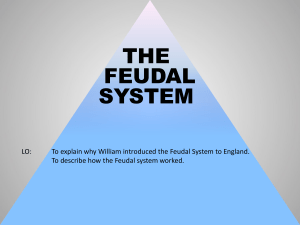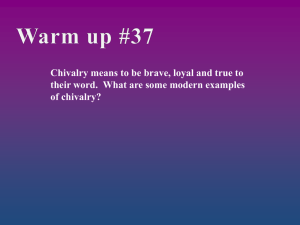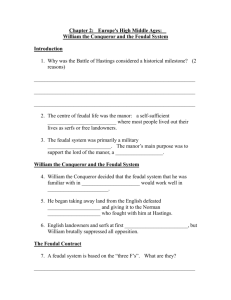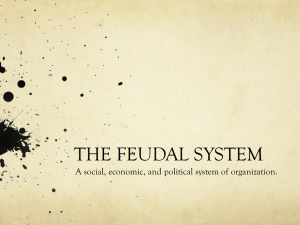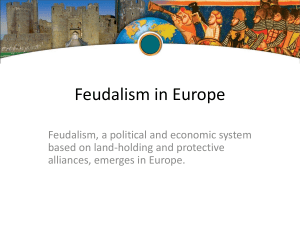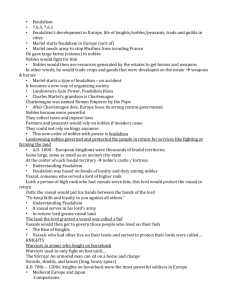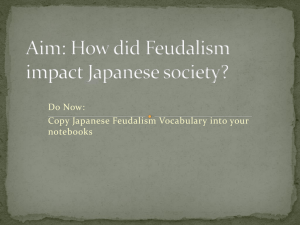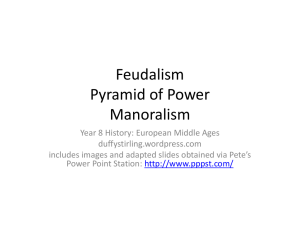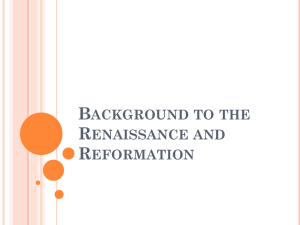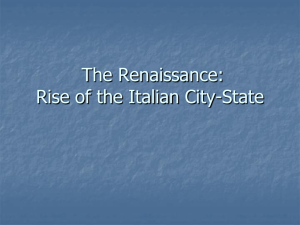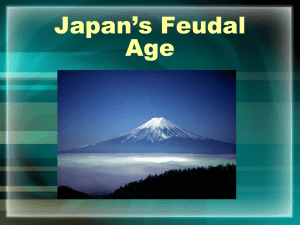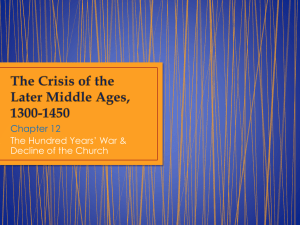Europe in the Middle Ages
advertisement
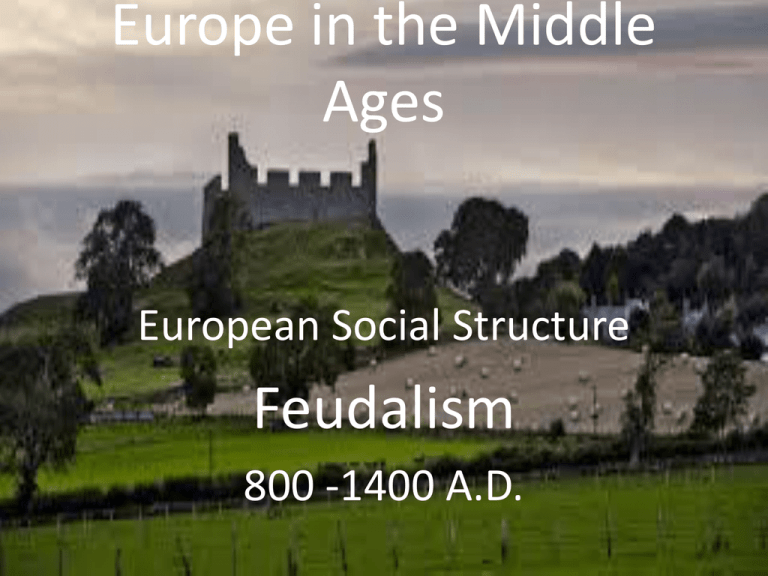
Europe in the Middle Ages European Social Structure Feudalism 800 -1400 A.D. Essential Standards • 6.C.1Explain how the behaviors and practices of individuals and groups influenced societies, civilizations and regions. Clarifying Objectives • 6.C.1.3 Summarize systems of social structure within various civilizations and societies over time (e.g., Roman class structure, Indian caste system and feudal, matrilineal and patrilineal societies). Essential Questions • What does a Feudal System depend on? • What is the difference between a Feudal System & a Caste System? • How does the Feudal System affect the life of a peasant/serf Social Structure • A Social Structure is how the people of a certain civilization are organized • It usually involves people being put into a class of people • Most Social Structures of civilizations fall into the categories of …. ① ② ③ ④ ⑤ Class Systems Caste Systems Feudalism Matrilineal Patrilineal Feudalism • Feudalism is a Social Structure that is based on the OWNERSHIP of LAND by different people • Feudalism was the Social Structure of Europe in the Middle Ages How much land do you own? • The more land you owned in Medieval Europe the higher you were in the Feudal System • Kings & Queens were at the top of the Feudal System & Peasants were at the bottom Structure of European Feudalism • Feudalism in Medieval Europe had 5 classes of people ① Kings & Queens ② Nobles ③ Knights ④ Craftsman ⑤ Serfs Upper Class & Lower Class • Upper Class of the Medieval European Feudal System were…. ① King & Queen ② Nobles ③ Knights • Lower Class in the Feudal System were… ① Craftsmen ② Vassals/Peasants/Serfs Kings & Queens • King & Queen owned all the land • They were at the very top of the Feudal Social Structure • King & Queen would reward Nobles by giving them land • They could take it back at anytime Nobles • Nobles were very high class people that owned a large amount of land • Nobles oversaw the Knights and the army & decided when to send them to battle • They would give land to a Knight for bravery in battle as a reward Manors • Manors were large plantations that vassals had to work on • Manors usually included a beautiful house where the noble lived • Also included hundreds of acres of land for farming land Knights • Knights provided the protection • Knights were professional warriors • Different from other warriors because they came from wealthy families & were skilled fighters Craftsmen (Builders) • Craftsmen were part of the lower class • They still were very skilled • They were builders & makers of tools • They owned a small amount of land usually on a farm Vassals/Peasants/Serfs (Slaves) • Peasants/Serfs were the laborers of the land • They were essentially slaves • They worked on large plots of land that was owned by a Noble or Knight (plantation) Vassals/Peasants/Serfs (Slaves) • They gave all the food they grew to the vassal for which they worked • In exchange the vassals protected them from enemies • They were never allowed to own any land Respect/Rewards • People of the lower class showed their RESPECT of people in higher classes by SERVING them • The more you served your higher ups the more REWARDS you would get EOG Questions • European Feudal Class Structure • The king owned the land. • The king granted land to nobles & knights in exchange for protection. • Nobles owned manors. • Peasants were bound to the manors. • Peasants worked the land in exchange for protection. • Peasants paid rent and farmed the land for nobles. • Peasants gave a percentage of their crops to nobles. • How did the feudal class structure affect the lives of the peasants? Explain one positive and one negative effect. Important Points • 6.C.1.3 (Feudal System) Europe in the Middle Ages operated their society on a Feudal System • 6.C.1.3 (Feudal System) Feudal System depended on how much LAND you OWNED • 6.C.1.3 (Feudal System) King gave land to the Nobles who controlled the Knights • 6.C.1.3 (Feudal System) Nobles gave land to the Knights in exchange for fighting wars & protection • 6.C.1.3 (Feudal System) peasants/slaves worked & lived on the land for the Nobles & Knights and provided food
